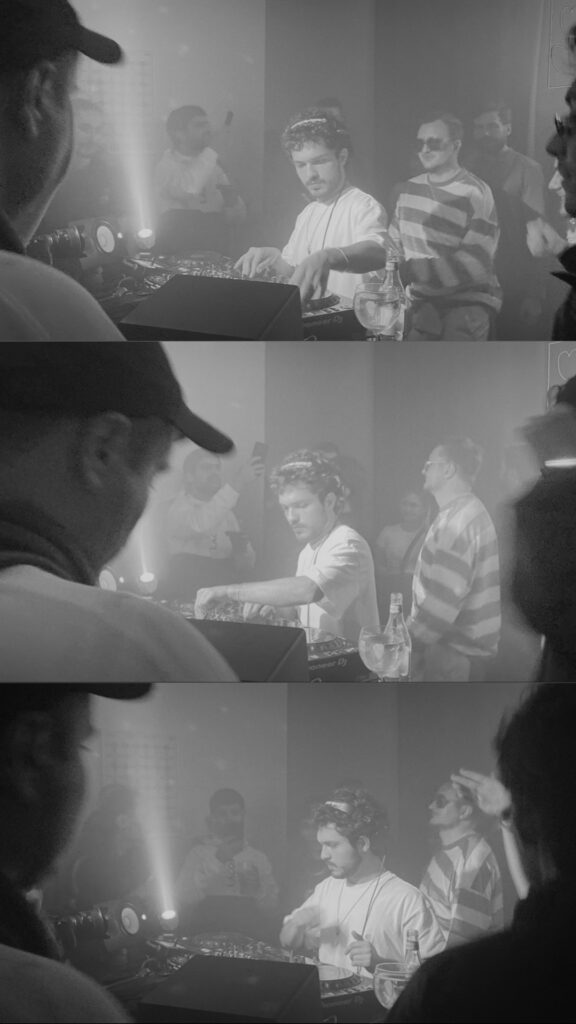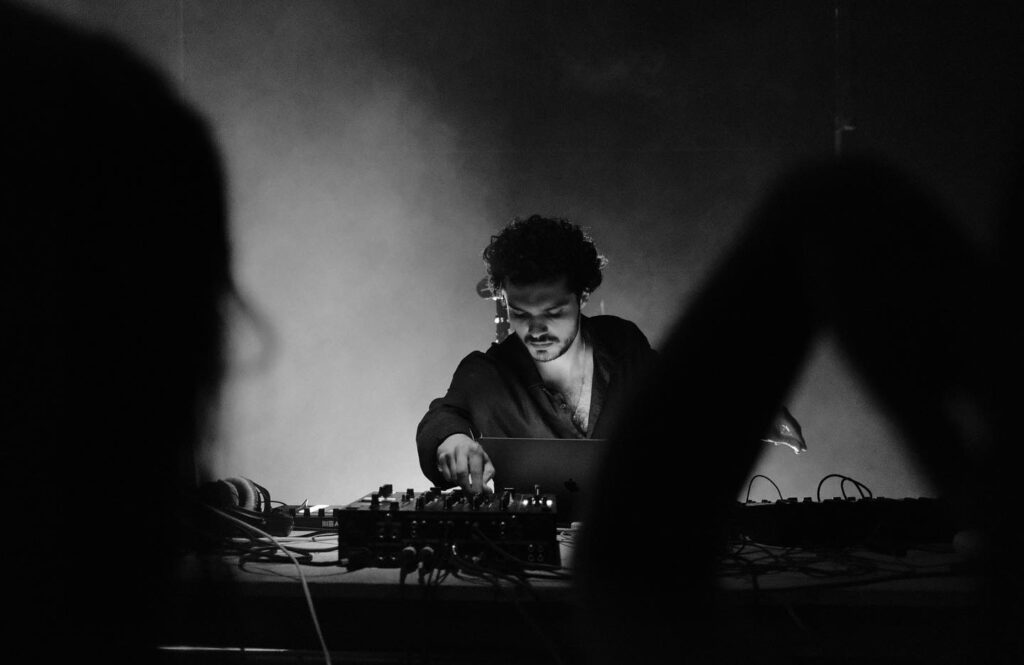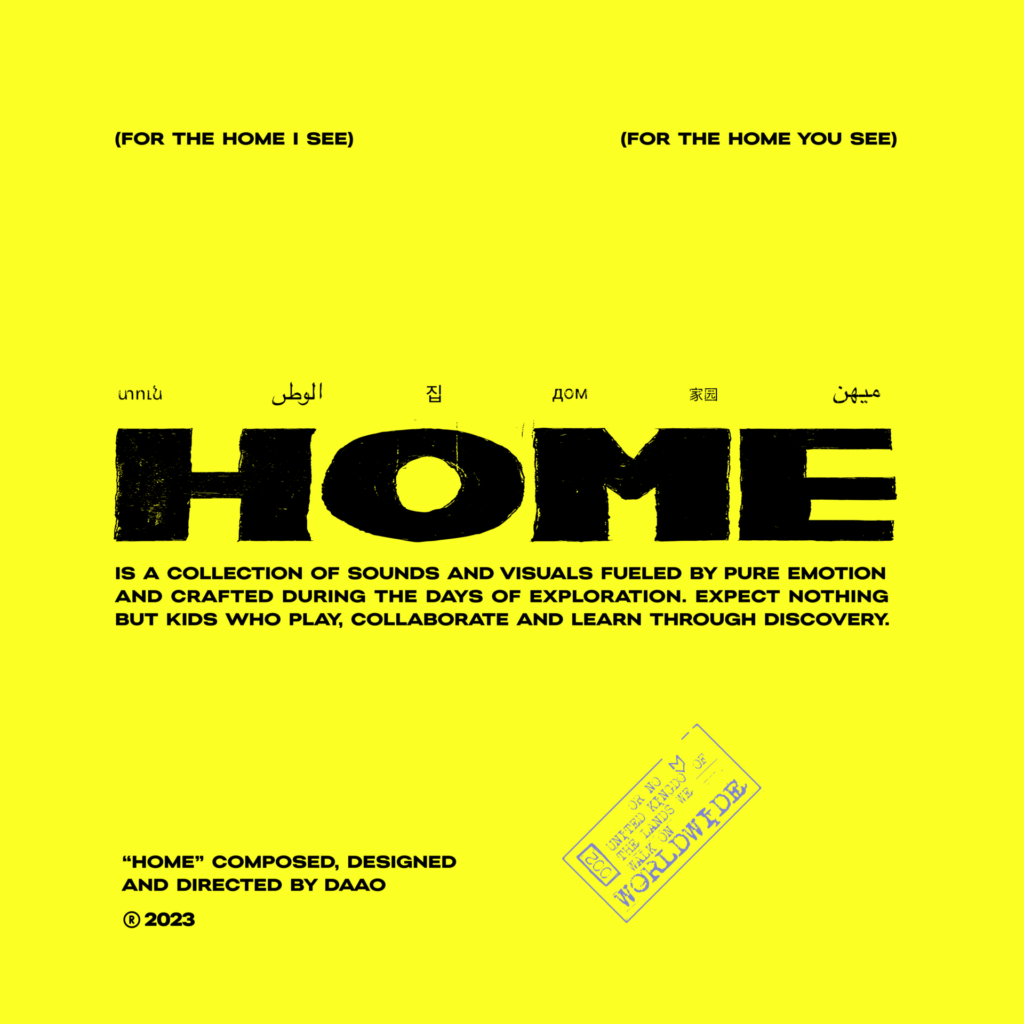On his latest album, HOME, renowned Armenian musician Daao introduces a mesmerizing fusion of old-school electronic groove and European Jazz that promotes cooperation among people of different religious beliefs. This extraordinary, evocative LP aims to inspire people all over the world to work, educate, and help each other more intensively, overcoming the barriers of different beliefs, with an inventive fusion of European jazz elements and an old-school electronic 808-sounding groove. Check out the exclusive interview below:

1. Can you tell us a bit about where you come from and how it all got started?
DAAO: I hail from the stunning city of Yerevan, the capital of the picturesque and mountainous Armenia. Our history and culture stretch back to ancient times, imbuing us with a deep sense of identity. My journey into music wasn’t a calculated decision; rather, it seemed to organically weave its way into the fabric of my life. Since as far back as I can recall, music has played some role in my existence. At a certain point, a vision took hold – whether it was one I formed or one that discovered me is hard to tell. This vision has guided my artistic path, continuously evolving and gaining complexity as I mature. Despite its metamorphosis, it remains a beacon of authenticity for me. Looking back, it’s clear that the compulsion to create has been an integral part of my being. At present, this creative impulse has found its manifestation in the world of music, expressed under the pseudonym “daao”. This journey is not just about producing music, but also about exploring the intricate tapestry of life, culture, and shared human experience.
2. Did you have any formal training or are you self-taught?
DAAO:My journey into music started at a young age when I joined a music school. This institution adhered to a traditional post-Soviet curriculum – it was challenging, but also enriching in its own way. It was during this time that I was introduced to the timeless masterpieces of musicians like Claude Debussy, Aram Khachatryan, Erik Satie, Ennio Morricone, and Arno Babajanyan. At the same time, I was uncovering a different musical world through my grandfather’s jazz mixtapes. The extraordinary sounds of jazz legends like Miles Davis and Charlie Parker added a captivating dimension to my musical understanding. These initial musical experiences subtly sculpted my musical perspective. However, it was nearly a decade later when I fully recognized and appreciated their influence. This moment of self-realization marked the birth of “daao.” With “daao,” I began to channel these influences into my own music, crafting pieces that are a true reflection of my evolved musical sense.
3. Who were your first and strongest musical influences and why the name ‘DAAO?
DAAO: In my early days, I barely grasped what music truly meant to me, let alone understood the concept of being influenced by it. However, I can recall the first time I realized I was being inspired by something: it was when I saw the movie “The Legend of 1900s”. In this film, I discovered Ennio Morricone and his compositions “Playing love” and “The Crave”. My influences evolved over time to include legends like Jimi Hendrix and the old school hip-hop scene from the East Coast. As for the moniker ‘daao’, it was organically given to me by a lifelong companion, friend, lover, friend I don’t know under which label to put her as we went through so much processes together that It’s just impossible to tell what she’s truly for me. As we grew up together, I remember struggling to find an appropriate name to represent my musical persona. The name ‘daao’ naturally evolved from my real name, Davit, which is often shortened to Davo. If you say ‘Davo’ quickly, it sounds quite like ‘daao’. However, the name ‘daao’ also holds a deeper meaning. In Chinese, it translates to ‘Path’, and in East Asian philosophy, ‘Dao’ represents the natural order of the universe, implying inner peace.
4. What do you feel are the key elements in your music that should resonate with listeners, and how would you personally describe your sound?
DAAO: The key elements that I believe should resonate with listeners in my music are the intricate blend of electronic grooves and acoustic percussions, arranged in a non-linear fashion. This unique arrangement creates an immersive sonic landscape that’s both engaging and distinct. Additionally, my understanding of melodies, usually rendered on a Rhodes, significantly contributes to the overall sound texture. The enchanting resonance of the Rhodes is indeed a crucial element in my music. At this stage, if I were to encapsulate my sound in a phrase, I’d describe it as ‘Electronic Fusion Jazz’. This term accurately captures the amalgamation of electronic, acoustic, and jazzy elements that are hallmarks of the daao sound experience.

5. Do you feel that your music is giving you back just as much fulfilment as the amount of work you are putting into it or are you expecting something more, or different in the future?
DAAO: I firmly believe in maintaining honesty with oneself as a prerequisite for creation. Thus, for me, expectations no longer play a significant role. My focus is on developing a mindset where the future is a byproduct of my present efforts and curiosity. Viewing things through this lens allows me to derive fulfilment from almost everything I do. Indeed, I think I’ve reached a point where I genuinely enjoy working hard, with the reward being the opportunities it brings. For instance, being able to perform in front of large audiences and express myself freely is a prize in itself. Whatever happens next, becomes part of my journey, part of history. The future, I believe, will unfold as it should, born out of my continuous dedication and love for what I do.
6. Could you describe your creative processes? How do you usually start, and go about shaping ideas into a completed song? Do you usually start with a tune, a beat, or a narrative in your head? And do you collaborate with others in this process?
DAAO:
The creative process for me is quite fluid and doesn’t adhere to a specific strategy. It varies with each project and song, and there isn’t a fixed formula that I follow. Sometimes, inspiration strikes with a tune or melody playing in my head, while other times it begins with a captivating beat or rhythm that sets the foundation. There are instances where a narrative or concept takes shape in my mind, driving the creative direction. Collaboration also plays a significant role in my process. Working with other musicians and artists brings fresh perspectives and ideas to the table. It’s a dynamic exchange of creativity, where each person contributes their unique talents and influences. Collaborations have the power to elevate the final outcome and breathe new life into the creative journey. In essence, I kinda put myself sometimes aside and perceive daao as a ground on which I can do whatever I want so my creative process remains flexible and open-ended, allowing the music to evolve naturally without constraints. Each song takes on a life of its own, guided by the sparks of inspiration and the collaborative energy that fuels its development.
7. For most artists, originality is first preceded by a phase of learning and, often, emulating others. What was this like for you? How would you describe your own development as an artist and music maker, and the transition towards your own style?
DAAO: Like many artists, my journey too began with a phase of learning and emulation. The initial stages were spent absorbing and studying various music styles and compositions. I was drawn to a wide array of music from the timeless compositions of Claude Debussy, Aram Khachatryan, and Erik Satie to the stirring sounds of Ennio Morricone, Arno Babajanyan, and the mesmerizing world of jazz opened to me through my grandfather’s mixtapes. The process of emulation, in my case, wasn’t about reproducing someone else’s style, but rather a way to delve deep into the essence of the music that moved me. It was about understanding the underlying musical concepts, exploring different techniques, and then using this knowledge as a foundation to build upon. Gradually, as I continued this journey of musical exploration and self-discovery, I began to notice the germination of my unique style. A style that had grown organically from a fertile ground of diverse musical influences and personal experiences. This transition to my own style wasn’t an overnight switch, but rather an evolution. It was a journey of maturation, where my musical perspective broadened over time and eventually found its expression through daao. With each composition, I learned to infuse my experiences and influences into my music, gradually paving the way for what has now become my signature style – a unique blend of electronic fusion jazz. It’s a space where electronic grooves interplay with acoustic percussions in a non-linear fashion, all painted with the rich color of Rhodes melodies.
8. What’s your view on the role and function of music as political, cultural, spiritual, and/or social vehicles – and do you try and affront any of these themes in your work, or are you purely interested in music as an expression of technical artistry, personal narrative, and entertainment?
DAAO: Music, in my view, serves multiple roles and functions. It can be a political, cultural, spiritual, or social vehicle, influencing and reflecting the state of society and the world at large. Systematic struggles often catalyze art into a form of strategic expression, a voice of protest, or a beacon highlighting societal issues. Besides being a personal form of expression or a means to unload one’s soul (which I often refer to as a “soul dump”), art, and especially music, has always been a powerful tool embedded in human culture. As a creator, I acknowledge that I have the capacity to communicate messages to my community through my art. Up until now, my intention hasn’t been to convey explicit political messages but rather to spotlight the issues that we, as a community, face. Take, for instance, my album “HOME.” While it carries a general message that can resonate with anyone, it holds special significance for my local community. The past few years have been tumultuous for us, marked by war and the feeling of being unheard and unsupported by the world. This, undoubtedly, impacted me and spurred a desire to understand and address the core problems we faced. The result was an organic infusion of these sentiments into my album. In essence, I believe the function and stimulus of music and art derive from all these aspects. However, I’d argue that there’s an organic order to it, and this order can shift depending on the struggles and times the creator is living through. Whether it’s a reflection of technical artistry, personal narrative, entertainment, or a response to sociopolitical circumstances, the purpose of music adjusts to resonate with the zeitgeist.
9. What has been the most difficult thing you’ve had to endure in your life or music career so far?
DAAO: The most significant hurdle for me has been the experience of solitude and detachment. It arose during a period of personal hardship when I realized that, despite the support and willingness of others to help, I had to confront and overcome my challenges on my own. This realization sparked a journey of embracing and navigating solitude in a healthy manner. Though people were willing to lend a hand, I recognized that ultimately, I was responsible for figuring things out and finding my own path forward. This process of self-reliance continues to be a challenge that I am actively working on, and I am pleased with the progress I have made. I firmly believe that my career and personal life are intertwined, and I view both as integral parts of my overall journey.
10. And what would you consider a successful, proud or significant point in your life or music career so far?
DAAO: For me, a truly successful and proud moment is when I can always feel a sense of accomplishment, regardless of external feedback.
KEEP IN TOUCH:
FACEBOOK | INSTAGRAM | SPOTIFY

